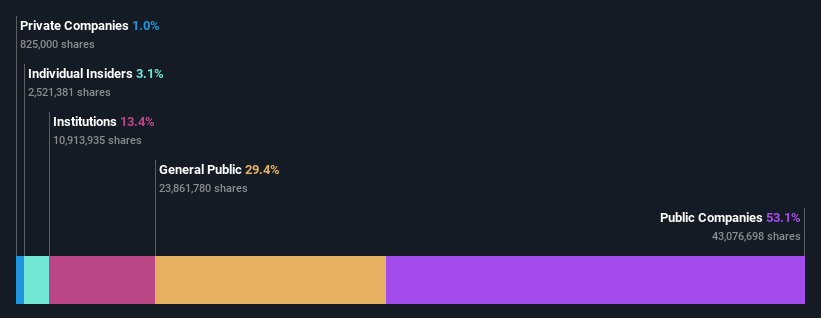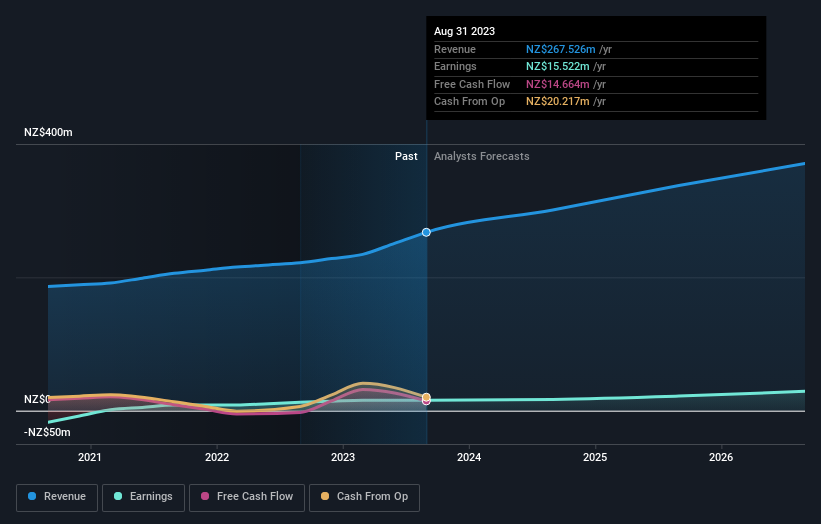Stock Analysis
- New Zealand
- /
- Machinery
- /
- NZSE:SCT
Scott Technology Limited's (NZSE:SCT) market cap dropped NZ$47m last week; Public companies bore the brunt

Key Insights
- Scott Technology's significant public companies ownership suggests that the key decisions are influenced by shareholders from the larger public
- 53% of the company is held by a single shareholder (JBS S.A.)
- Institutional ownership in Scott Technology is 13%
Every investor in Scott Technology Limited (NZSE:SCT) should be aware of the most powerful shareholder groups. With 53% stake, public companies possess the maximum shares in the company. That is, the group stands to benefit the most if the stock rises (or lose the most if there is a downturn).
As market cap fell to NZ$270m last week, public companies would have faced the highest losses than any other shareholder groups of the company.
In the chart below, we zoom in on the different ownership groups of Scott Technology.
Check out our latest analysis for Scott Technology

What Does The Institutional Ownership Tell Us About Scott Technology?
Institutional investors commonly compare their own returns to the returns of a commonly followed index. So they generally do consider buying larger companies that are included in the relevant benchmark index.
Scott Technology already has institutions on the share registry. Indeed, they own a respectable stake in the company. This implies the analysts working for those institutions have looked at the stock and they like it. But just like anyone else, they could be wrong. It is not uncommon to see a big share price drop if two large institutional investors try to sell out of a stock at the same time. So it is worth checking the past earnings trajectory of Scott Technology, (below). Of course, keep in mind that there are other factors to consider, too.

Hedge funds don't have many shares in Scott Technology. JBS S.A. is currently the largest shareholder, with 53% of shares outstanding. This implies that they have majority interest control of the future of the company. With 6.9% and 2.7% of the shares outstanding respectively, Oakwood Securities Limited., Asset Management Arm and Accident Compensation Corporation, Asset Management Arm are the second and third largest shareholders.
While it makes sense to study institutional ownership data for a company, it also makes sense to study analyst sentiments to know which way the wind is blowing. There is a little analyst coverage of the stock, but not much. So there is room for it to gain more coverage.
Insider Ownership Of Scott Technology
While the precise definition of an insider can be subjective, almost everyone considers board members to be insiders. Management ultimately answers to the board. However, it is not uncommon for managers to be executive board members, especially if they are a founder or the CEO.
I generally consider insider ownership to be a good thing. However, on some occasions it makes it more difficult for other shareholders to hold the board accountable for decisions.
Our most recent data indicates that insiders own some shares in Scott Technology Limited. As individuals, the insiders collectively own NZ$8.4m worth of the NZ$270m company. It is good to see some investment by insiders, but we usually like to see higher insider holdings. It might be worth checking if those insiders have been buying.
General Public Ownership
The general public-- including retail investors -- own 29% stake in the company, and hence can't easily be ignored. While this size of ownership may not be enough to sway a policy decision in their favour, they can still make a collective impact on company policies.
Public Company Ownership
Public companies currently own 53% of Scott Technology stock. It's hard to say for sure but this suggests they have entwined business interests. This might be a strategic stake, so it's worth watching this space for changes in ownership.
Next Steps:
I find it very interesting to look at who exactly owns a company. But to truly gain insight, we need to consider other information, too.
Many find it useful to take an in depth look at how a company has performed in the past. You can access this detailed graph of past earnings, revenue and cash flow.
But ultimately it is the future, not the past, that will determine how well the owners of this business will do. Therefore we think it advisable to take a look at this free report showing whether analysts are predicting a brighter future.
NB: Figures in this article are calculated using data from the last twelve months, which refer to the 12-month period ending on the last date of the month the financial statement is dated. This may not be consistent with full year annual report figures.
Valuation is complex, but we're helping make it simple.
Find out whether Scott Technology is potentially over or undervalued by checking out our comprehensive analysis, which includes fair value estimates, risks and warnings, dividends, insider transactions and financial health.
View the Free AnalysisHave feedback on this article? Concerned about the content? Get in touch with us directly. Alternatively, email editorial-team (at) simplywallst.com.
This article by Simply Wall St is general in nature. We provide commentary based on historical data and analyst forecasts only using an unbiased methodology and our articles are not intended to be financial advice. It does not constitute a recommendation to buy or sell any stock, and does not take account of your objectives, or your financial situation. We aim to bring you long-term focused analysis driven by fundamental data. Note that our analysis may not factor in the latest price-sensitive company announcements or qualitative material. Simply Wall St has no position in any stocks mentioned.
About NZSE:SCT
Scott Technology
Scott Technology Limited, designs, manufactures, sells, and services automated and robotic production lines, and processes for various industries in New Zealand and internationally.
Reasonable growth potential with adequate balance sheet.

